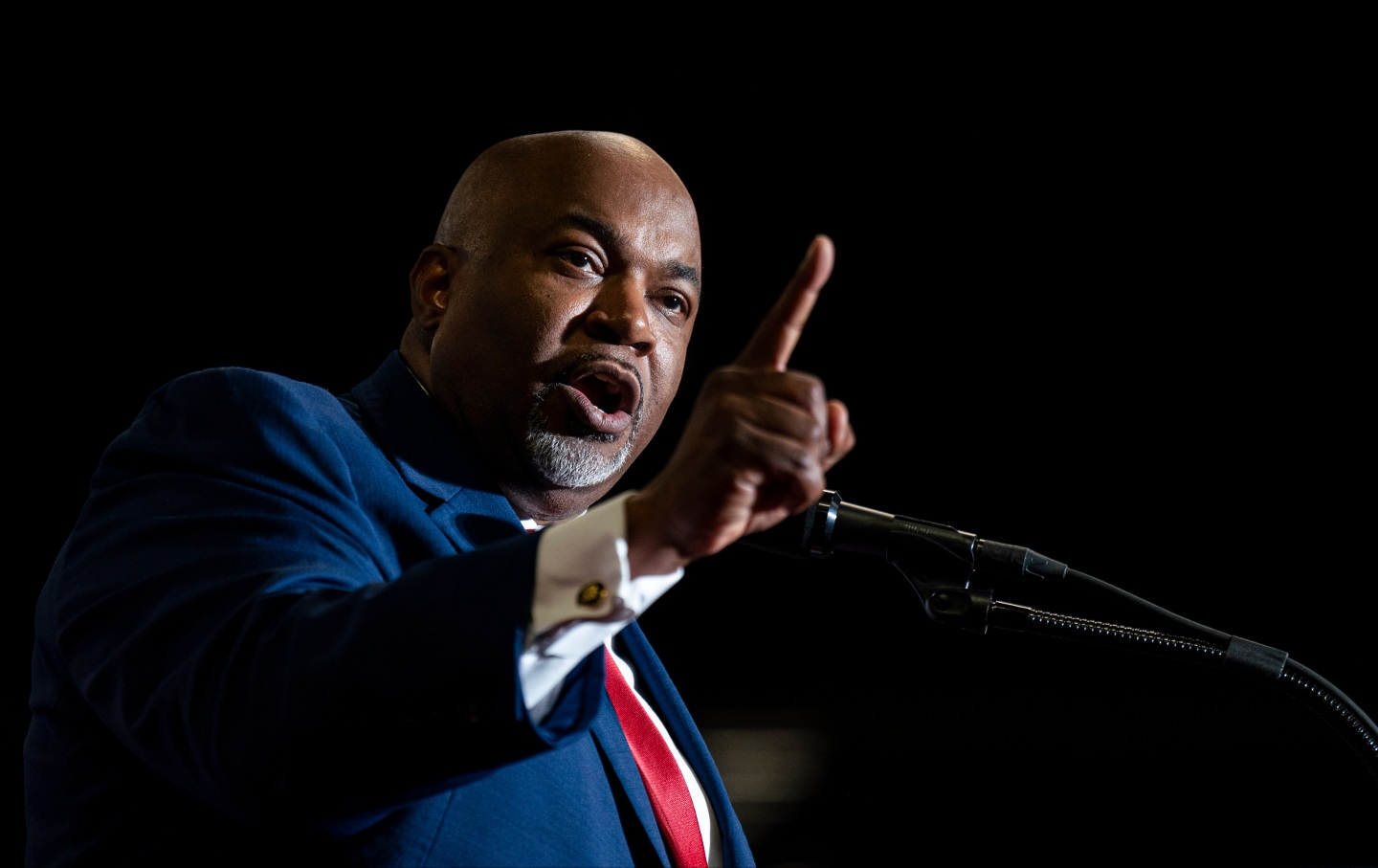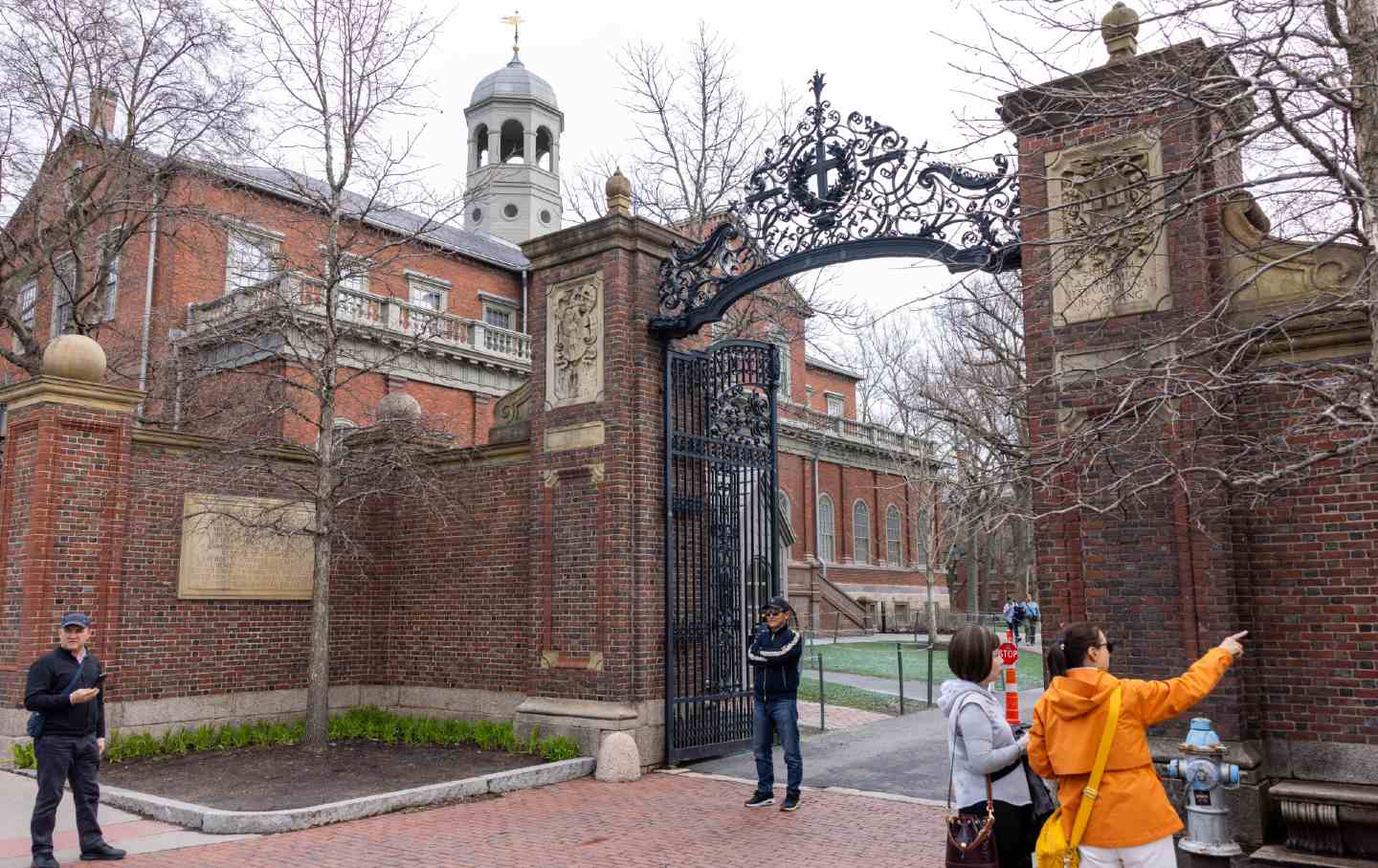North Carolina’s GOP Nominee for Governor Is a Far-Right Fanatic—and He’s Not Alone
Mark Robinson is the most high-profile example of the radicalization of North Carolina’s Republican Party. But there’s plenty more where he came from.

Mark Robinson, lieutenant governor of North Carolina, speaks during a “Get Out the Vote” rally with former US president Donald Trump in Greensboro, N.C., on Saturday, March 2, 2024.
(Al Drago / Bloomberg via Getty Images)If you aren’t familiar with Mark Robinson—the hard-line Christian nationalist lieutenant governor of North Carolina, who clinched his state’s Republican gubernatorial nomination last Tuesday—you will be soon. Robinson is set to become one of 2024’s inescapable candidates in the next eight months, as he campaigns for one of the most pivotal gubernatorial offices in the country, and the Democratic Governors Association slowly drops the Ulysses-size opposition file it presumably has on him.
Robinson is running one of the most visible radical right-wing campaigns in the country, and whether he succeeds in defeating Democratic Attorney General Josh Stein will be a litmus test for how far right North Carolinians are willing to go. Robinson’s seemingly endless array of sexist, homophobic, antisemitic, and generally bigoted comments has gained significant attention since he won his primary last week. That attention is understandable and necessary. But it’s equally necessary not to view Robinson’s political rise in a vacuum. He hasn’t come out of nowhere, and he’s not alone.
Others running on the Republican statewide slate are just as extreme. Together with Robinson, they paint a vivid, frightening portrait of what can happen when the modern-day GOP manages to capture state government, even in a swing state, as thoroughly as North Carolina Republicans have over the last decade. This is what a party that has completely insulated itself from electoral consequences looks like.
Robinson’s story is a far-right populist dream. In his book, We Are the Majority, he traces his conservative awakening to when he lost the furniture factory job that gave him purpose, a blow he attributes to the North American Free Trade Agreement, which helped eliminate at least 87,000 jobs in North Carolina within the first eight years of its passage. In 2018, Robinson went viral for a speech about gun rights at a Greensboro City Council meeting (he didn’t even own a gun at the time, he told a Charlotte TV outlet). He then launched a successful campaign for lieutenant governor in 2020, when much of the state’s attention was focused on high-profile presidential, Senate, and gubernatorial elections.
Since then, the full extent of Robinson’s reactionary politics has become abundantly clear. He has called LGBTQ people “filth,” defended now-convicted sex criminals Harvey Weinstein and Bill Cosby, and previously said that the Holocaust was “hogwash”—a comment he attempted to downplay, naturally, by declaring an “Israel solidarity week” in October. (Stein is the state’s first Jewish statewide elected official, and would be the first Jewish governor if elected.)
More indicative of how he would govern, Robinson said last month during a campaign rally that trans women should be arrested for using the women’s bathroom, and last year he said during a radio interview with a Republican state representative that he would sign a bill banning abortion “for any reason.”
Other Republican nominees for the Council of State, a group of 10 executive offices elected statewide, echo Robinson’s reactionary conservatism. US Representative Dan Bishop, the only Republican to file for attorney general, was the lead author of the infamous House Bill 2 in 2016 that helped usher in the wave of anti-trans mania over the last several years. In a primary for state superintendent, which oversees the state’s public school systems, Republicans dumped the incumbent in favor of a right-wing activist who encourages parents not to send their kids to public school and calls those schools “indoctrination centers.”
During Robinson’s four years as lieutenant governor, and particularly over the last year since Representative Tricia Cotham’s absurd party switch in a liberal district gave the GOP a sham supermajority, the GOP has muscled its veto-proof agenda through on a voucher schemes that will gut public school, on tax cuts, and a 12-week abortion ban that eroded access for millions of people in the South. Governor Roy Cooper, one of the most successful politicians electorally in state history, has largely been relegated to the sidelines during his last two years in office, with one notable exception being the state’s passing a long-overdue expansion of Medicaid.
The GOP has been able to do this, in a state that has had only Democratic governors for all but four of the last 32 years, by implementing redistricting maps that can most charitably be described as a loose interpretation of what constitutes representative government. The period after 2011 saw a flood of lawsuits over legislative and US House maps, and in 2019, the Supreme Court validated partisan gerrymandering in Rucho v. Common Cause, a case that appropriately originated in North Carolina.
A new conservative state Supreme Court majority elected in 2022 then overruled its own precedent and gave its blessing to partisan gerrymandering. New maps enacted by the General Assembly in October are expected to flip at least four US House seats to the GOP, and the state Senate maps passed essentially lock in a Republican majority for the next eight years. (A federal judge who once represented North Carolina Republicans in a redistricting case declined to block the map from going into effect this year, after plaintiffs alleged that the maps dilute the Black vote in the northeastern part of the state.)
These rigged, permanent majorities have pushed the GOP caucuses in the legislature harder and harder to the right. After passing HB 2, which Bishop not only wrote but also patiently explained to Governor Pat McCrory after McCrory signed it, the state lost hundreds of millions of dollars largely through corporate boycotts, back during the brief period where corporations pretended to care about the dignity of trans people.
It also cost McCrory his job, when he narrowly lost reelection to Cooper in November. Four years later, Cooper faced Robinson’s predecessor as lieutenant governor, Dan Forest, and won by nearly 250,000 votes. Cooper never trailed in a single independent poll, and a big part of the reason was that, unlike McCrory in 2012, Forest never even tried to portray himself as a moderate. Forest, like Robinson now, was an evangelical cultural warrior through and through.
That’s not to say North Carolina, the home of Jesse Helms, isn’t susceptible to these types. But Robinson’s thorough evisceration of two more traditional North Carolina Republicans, businessman Bill Graham (endorsed by US Senator Thom Tillis) and state Treasurer Dale Folwell, in the primary, can’t be looked at in a vacuum. It’s the product of a Republican Party and base that’s remade the state’s politics over the past decade and isn’t finished yet.
Josh Stein, on the other hand, is promising to govern in the mold of Cooper and former four-term governor Jim Hunt, whose daughter, Senator Rachel Hunt, will be Stein’s running mate. Stein’s pitch is that he’ll be a bulwark for democracy and against the legislature’s excesses, so long as Democrats can muster wins in enough House and Senate seats to avoid a supermajority.
Popular
“swipe left below to view more authors”Swipe →But the two-term attorney general has never demonstrated the same level of electoral dominance as Cooper, who has never lost an election and has spent the past 24 years in statewide office; in both of his statewide races, Stein just barely edged past his Republican opponents. Early polls also indicate Trump is a favorite to carry the state for the third election in a row, which won’t do Stein many favors.
Long-term, North Carolina Democrats will have to reckon with the impact national polarization has had here. The party that passed one of the country’s earliest “right-to-work” laws also must, finally, fully embrace unions. Longtime Democratic state representative and Chamber ally Michael Wray, who has consistently voted with the GOP and even overridden Cooper’s veto on a few occasions, went down in a primary where UNITE Here Local 23 spent six figures on a canvassing operation for his opponent, teacher Rodney Pierce. Pierce’s win is a signal that the renewed effort to organize workers in the South has the potential to pay dividends as well, so long as Democratic candidates work as hard to remove obstacles to organizing as organized labor does to elect Democrats.
For now, it may be that fear and revulsion aroused by Robinson’s views, fury over how the 12-week abortion ban went down, national party support, and renewed energy in the state Democratic Party will be enough to catapult Stein into the governor’s mansion and halt a further erosion of civil rights and democracy. But as long as the GOP maintains its iron grip on state politics, North Carolina’s rightward drift will continue—the only question being how fast and far it goes.
Hold the powerful to account by supporting The Nation
The chaos and cruelty of the Trump administration reaches new lows each week.
Trump’s catastrophic “Liberation Day” has wreaked havoc on the world economy and set up yet another constitutional crisis at home. Plainclothes officers continue to abduct university students off the streets. So-called “enemy aliens” are flown abroad to a mega prison against the orders of the courts. And Signalgate promises to be the first of many incompetence scandals that expose the brutal violence at the core of the American empire.
At a time when elite universities, powerful law firms, and influential media outlets are capitulating to Trump’s intimidation, The Nation is more determined than ever before to hold the powerful to account.
In just the last month, we’ve published reporting on how Trump outsources his mass deportation agenda to other countries, exposed the administration’s appeal to obscure laws to carry out its repressive agenda, and amplified the voices of brave student activists targeted by universities.
We also continue to tell the stories of those who fight back against Trump and Musk, whether on the streets in growing protest movements, in town halls across the country, or in critical state elections—like Wisconsin’s recent state Supreme Court race—that provide a model for resisting Trumpism and prove that Musk can’t buy our democracy.
This is the journalism that matters in 2025. But we can’t do this without you. As a reader-supported publication, we rely on the support of generous donors. Please, help make our essential independent journalism possible with a donation today.
In solidarity,
The Editors
The Nation








